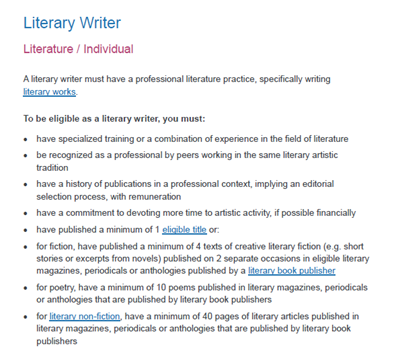
My hopes weren’t dashed, though. Although I’m proud to be an indie author, I do understand the desire to keep resources for people who tackle writing as a business, and who have already established themselves with a readership or acquired some credibility by having an agent/publisher. So I emailed them to ask if there were any exceptions to the self-published rule (# of published titles, for example, or minimum income earned).
I received the following reply.
No, there are no exceptions to the rule. We do not count self-published works as professional publications. By our definition, a professionally published work has gone through an editorial selection process, and the writer has been fairly compensated for the publication of their work.
I was directed to review the classification for a “literary writer”

Overall, this list makes sense, and I agree with most of it.
With the exception of “…implying an editorial selection process”.
This is the part that excludes a wide number of Canadian authors from receiving Government support*. While this would have been applicable and acceptable even ten years ago, the fact that it is no longer a requirement for artistic recognition or success by readers or among authors should mean that it is no longer a requirement to be seen as a professional.
Especially since the other items on that list have already been achieved and even surpassed by most indie authors I know.
Also included in the email was a suggestion that I look into the Ontario Arts Council.
Generally speaking, provincial and municipal funding bodies have less stringent criteria than our own. For example, I know that the Ontario Arts Council accepts self-published works.
Fortunately, this information is correct. While not all grants are eligible for self-published authors, there are some that are, which says a lot for the forward thinking and adaptability of the Ontario Arts Council. The difference, of course, is the size of the grants, which are significantly smaller on a provincial level.
Being excluded from the federal grants reinforces the stigma against independent authors and excludes artists looking to add their voices to Canadian culture.
At this point, I turned my attention to Canadian Heritage, but do intend to follow up to request their rationale and also find out what steps would be required to request a review of these definitions/requirements. Once I have updates, I’ll be sure to add them here.
*not listed here is the requirement of a print run, but I know of at least one author who was denied a grant because she did not have a print run of 350 books through her publisher.